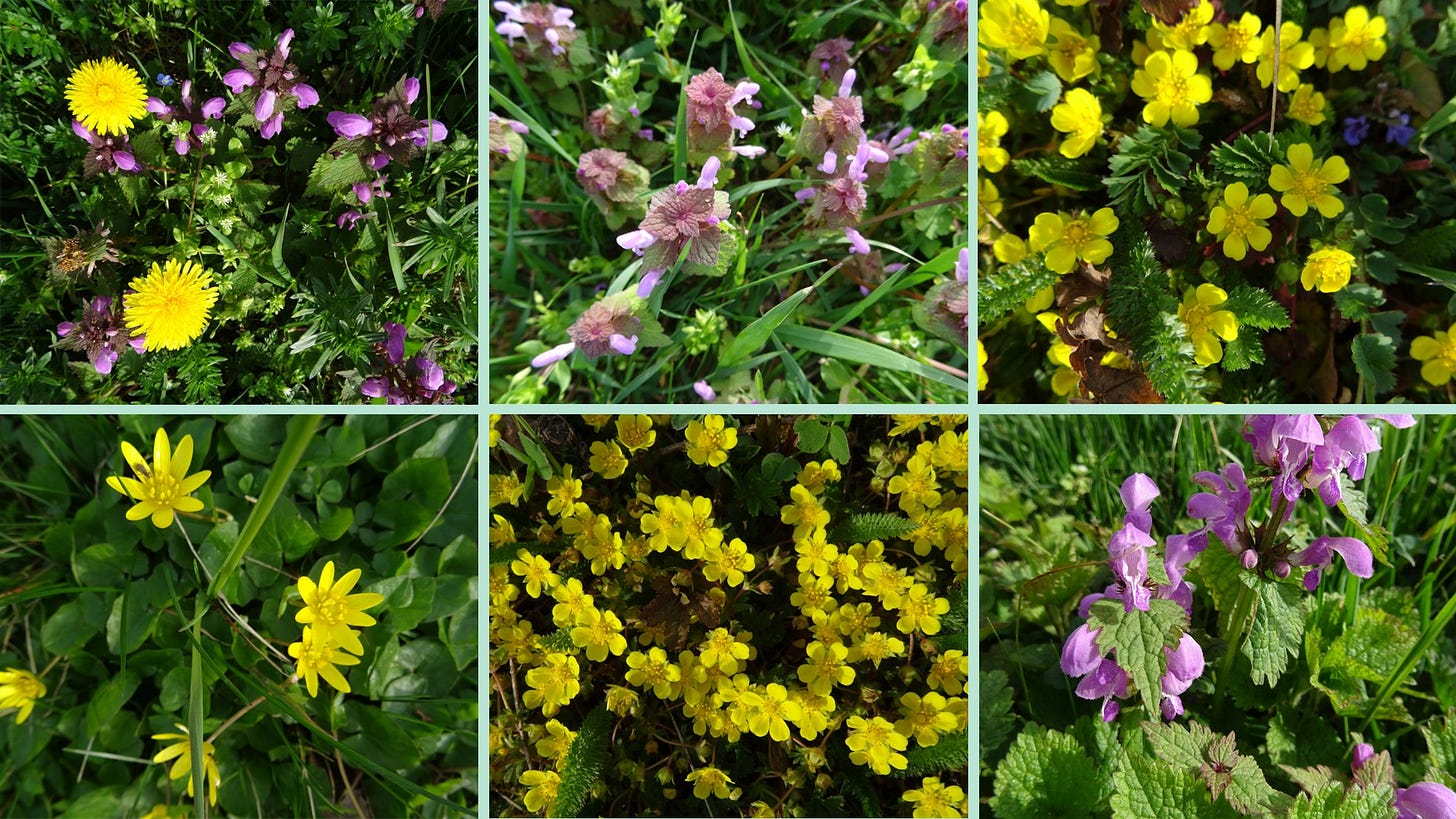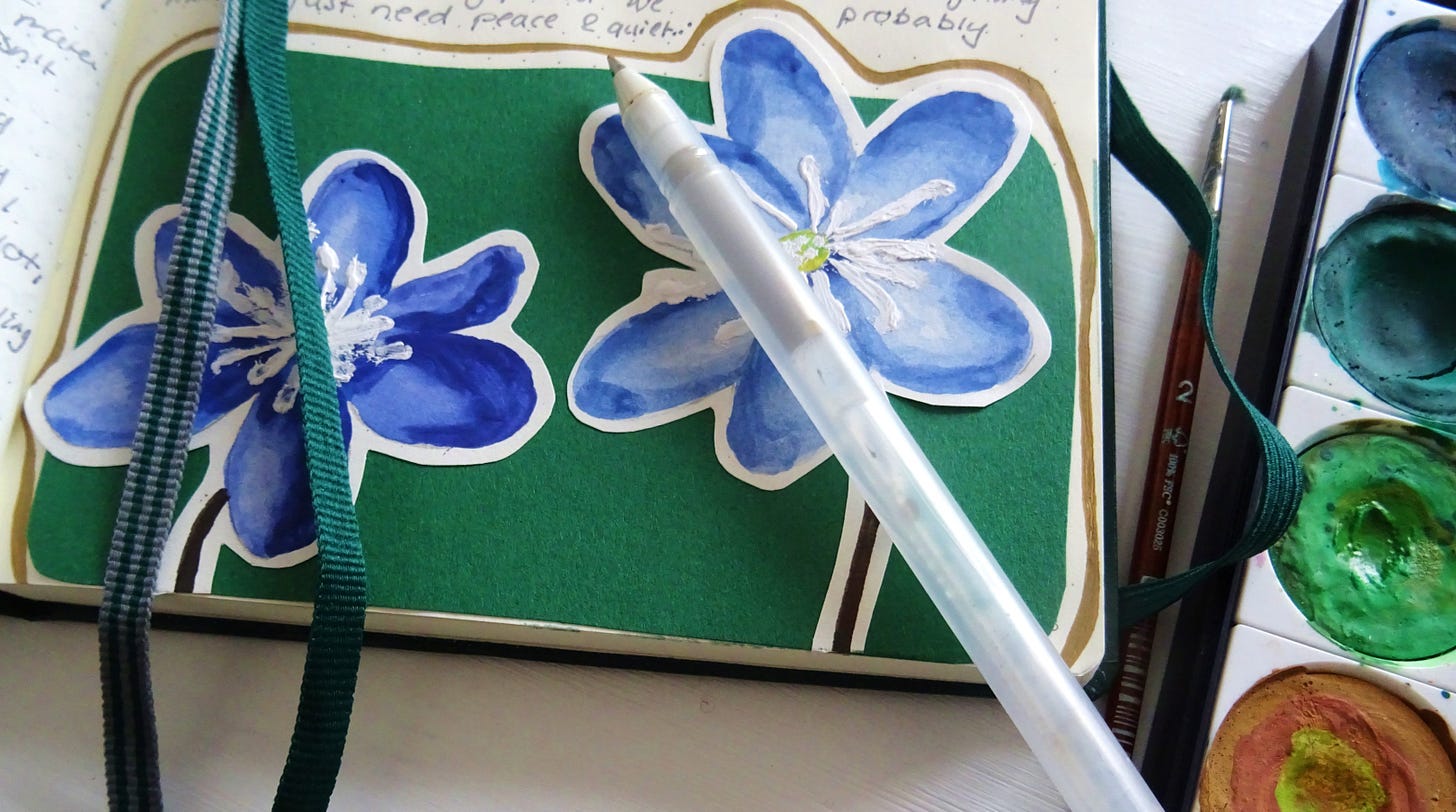Each month of 2025 will have a theme that guides my outdoor explorations and my reading. In April, the theme is Nature journaling.
Hi readers, I hope you’re doing well! As I write a nature journal this month, my plan for today’s post had been to share some pictures and texts from my journal. I’ve been spending much time outside and going on sunny spring trips – walking, biking, and kayaking.
But I find that it’s difficult for me to write “only” about nature. Connecting with nature isn’t just a new hobby for me. Maybe you’ve guessed from my earlier posts that it is part of a larger change in priorities – and when writing about nature, I inevitably end up reflecting on that change. I am sure I’m not the only one for whom a focus on nature is part of letting go and starting a new chapter. I often feel a similar spirit in posts here on Substack, and it’s a theme in books like Hermit as well. So, today’s post gives you a glimpse of these thoughts.
A few days ago, I went for my first kayaking session of the year. On my way to the lake, I had a 40-minute wait at a countryside train station. It was sunny and calm; there were no people around. I sat on a small meadow, covered in yellow and purple flowers, and read my book. But again and again, I was distracted by a group of birds, going in and out of a tree so covered in ivy that you could mistake it for an ivy tree. Whenever I hear bird sounds I do not recognize at all, wondering whether I’ve finally discovered a new species (the dream of every biologist, right?), it’s usually starlings – they have such a broad repertoire! I watched the starlings chase each other and make rapid manoeuvres in the air. When one suddenly let itself sink down at high speed, I felt my stomach drop as if I was on a roller coaster. After a while, I became aware of the time and the rest of the world around me again. For a moment, I felt perfectly happy. Do you remember that happiness when you don’t carry any baggage, like on long childhood summer days?
But one moment later, I also felt sad. It’s a sadness that often appears when I see beauty in nature these days – when I just enjoy the colours of the flowers or the little noises of a stream. I don’t know if anyone can relate. But being happy just like that, not needing all the things I’m supposed to need and not striving for all the things I’m supposed to strive for, feels like I am leaving something behind that I held on to for all my adult life.
I am a scientist and have worked in the academic system for 20 years. It’s a system where people are under enormous pressure, many relocate to a new country every few years, and working nights and weekends is common. I have a tendency towards excessive motivation, and I love scientific work. I actually enjoy the narrow focus when working towards a deadline, I liked the relaxed Sundays in the lab and the rush of adrenaline when receiving the decision email from a journal where I submitted a manuscript. So, for a long time I wasn’t unhappy and did well.
But there is a price to long-term work in a high-pressure environment1. My work and private life are inextricably connected – I met almost all my friends and ex-partners in academia. Probably it’s obvious that this isn’t wise, but as an introvert who frequently moved and worked a lot, I just didn’t have the energy to find friends outside work. My colleagues were my community. But in academia you’re measured by your academic success, and affection and scientific appreciation can get mixed up. It can be hard to see your value as a person as separate from your academic success, and I have friends who totally overwork themselves as a result. Most people only get short-term contracts, the turnover is high, and people who do not “function”, e.g. due to physical or mental health issues, are easily left behind. Priorities get distorted. There are colleagues I considered good friends who I never managed to meet outside work even though we lived minutes away from each other, or who did not call me once when I was ill for months. And most people do not have the energy to engage politically or for nature, no matter how urgent it would be.
Because this world was my main social environment, I internalised the pressure. I accepted that relationships are not about true care and that my value is conditional on being successful at work. In the end, simple joys – like the happiness brought about by watching nature without an agenda – almost made me feel guilty because they were not “productive”. And because I wanted to contribute to making the world a better place but couldn’t do so at my job, I volunteered, ending up with no free time at all on many days.
Lately I’ve started to understand that I don’t have to live that way. I want to help create a world where we treat each other and the environment with respect; how is that ever going to work out if I don’t even manage to treat my friends and myself well?
I have reduced my work hours2 and am looking into alternative career options. I try to learn about conservation, volunteer for the causes I care about most, reconnect with a few like-minded people, and have started writing here on Substack.
I read for enjoyment again. And mainly, I spend time in nature just for the sake of it. I walk around randomly and look at what interests me. I take detours to see a specific tree or a patch of flowers I’ve noticed before. These are things I was almost unable to do for a long time. I did spend time outdoors, but some part of me was always trying to make it “useful” (e.g. for exercise) or impressive (e.g. climbing a high mountain). I still find it difficult to let go of that sometimes.
Whenever I just enjoy the small things in nature, I step a little bit more outside that world where I tried to belong. It’s as if when I allow myself to just be happy, I break the unwritten rule that happiness and peace can only come with success. Inevitably, this means letting go of the people who I thought were my friends but who really mainly see me as a cog in the machine; and in the end letting go of a feeling of community. That day on the meadow with the starlings, I felt light, but I also felt alone.
Hannah
Much of what I write about is not unique to academia – I think it’s a symptom of the value system in our society that affects many other jobs as well, even though the specifics of course vary.
This might not sound like a big deal, but it’s essentially unheard of in my circles.




Thanks for sharing your transition! Your post resonates well as we are on a somewhat similar path. I let go of my consultancy work last year after my health diagnosis, now on a new chapter with an open path.
The feeling of being alone will gradually fade as you spend more time outdoors, especially when you begin to replace people-y relationships with the presence of trees, birds, insects and other critters who do not judge your mind, but your energy. Thank you for sharing your nature journal with us all!